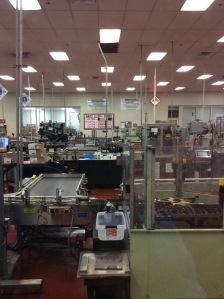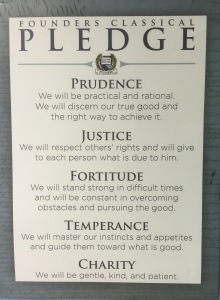In looking at my journal, today (April 1st – April Fools Day) will mark day 12 of our quarantine here at home. I am thankful to have a job right now during this time and that I am able to work from home. My children are continuing their school studies via distance learning. This has been a different time for all of us. Thankfully, neither of my kids has expressed any anxiety or worry (yet). They continue on in their daily routines, getting up, getting dressed and attending school online from their respective bedrooms.
I already work from home three days a week (Wed-Fri) and prior to the crisis was in the office two days a week (Mondays and Tuesdays), so adjusting to working from home was not as big of a deal as it might have been for those who spent most of their time working in an office five days a week. I do not have a dedicated room set aside as an office, but rather a small corner of our living room which is actually supposed to be the dining room. There is a visible division between this room and our living room, a small chair rail that is hardly visible but yet it informally marks the division between the two rooms. I have never really had a room that I could set aside as my office, so I have learned at various times to get creative in my work. Most of the time when I am working from home, my children would be at school and the house would be relatively quiet during my working hours. That has all changed. Now that I am working from home 5 days a week, the WebEx meetings, conference calls and even virtual training sessions have increased. When I start my day, I let my family know when I will be online and whether or not I will be using my camera for a meeting. This week has been unique because I have been conducting a virtual training session for a team located in Jacksonville, FL. I have never done virtual training until this week and it has definitely been a challenge and it has made me stretch and grow and learn. I have always done the training that I am conducting in person and I had forgotten how much I missed it until this week. My family has been very understanding this week especially since it has been an unusual one. One other thing I noticed when you are working from home each day, it is hard to break away from it simply because you are already at home and since we are currently sheltering in place, that it can seem like you spend a lot more time working than you did before. You can feel like you do not have a break because you are either working, eating, sleeping or keeping up with domestic tasks like paying bills, etc. I think when this is all over, people will have a greater appreciation for certain things like their freedom.
I am an introvert by nature, although many people may have a hard time believing it because I talk more than the average introvert. These last two weeks have really tried me and have been a challenge. I am used to some sort of interaction with people and it has ground to a halt due to social distancing (I prefer physical distancing) People seem busier now than they were before this pandemic literally changed everything between March 11-13. I miss the interactions that I had with my coworkers and other colleagues. I miss the monthly dinners that I had with some of the men from my church (we were meeting the 4th Thursday of every month). I miss our Sunday School class members, even though we are continuing to meet online each Sunday. I still miss being with them not only as a fellow class member, but also as an occasional teacher.
I read a quote the other day from Betsy Childs Howard from The Gospel Coalition that I agreed with – I agreed with it so much that I posted on my Facebook feed in hopes that I could encourage others
I am an introvert, but the lack of social interaction in these difficult days is starting to get to me. It feels like a balm when the faces of my church community group pop up on our weekly Zoom call. Phone calls and texts are lifelines rather than distractions.
I remember H1N1 and SARS and thinking that when H1N1 was going around, people were acting then like it was the end of the world. I do not remember any toilet paper hoarding in either of those crises, but I remember people being very worried, concerned and scared.
It is very easy to dwell on the negative when things are grim and serious. You can watch too much news and get depressed by that. I have limited my news intake to once or twice a day usually in the morning and then the 10 PM news. Those of you who know me personally may not realize that I am an information junkie, but doing so now could thrust me or anyone else into a downward spiral of depression by taking in too much news especially now. It is important to stay informed and know what is going on in the world, but there is also such a thing as information overload.
I am especially thankful for those who are on the frontlines – people working in the grocery stores, those who work in hospitals and clinics taking care of sick people – literally putting their lives on the line, those who are making deliveries to stores, public servants like firefighters and police officers who are still going to work and protecting our communities even at an increased risk to themselves and their own families.
I often wonder what will happen when things return to “normal” and I define normal for me as life as it was before March 10, 2020. That was the last day I was in the office before our company invoked a work from home policy in response to the spread of COVID-19. I miss having dinner with our friends, especially on nights like Taco Tuesday. We still had tacos last night but it was just not the same without our friends. I think in the midst of a crisis like this, you will know who your friends are – they are the ones who will email, call, text, FaceTime just to see how you are doing. I also think people will have a greater appreciation for their friends as well especially after being distanced from them for sometime now. This is also a time where families can be tested. When you are in the same house all day, things can get a bit stressful. Thankfully we have tried each day to go out of the house to take what I call – keep your sanity walks. I tend to take a couple of these a day based on my workload. It is just a short walk around the block and then back in the house. Outside of going out for necessities, I have stayed very close to home. I am very careful and conscious about where I am going, what I need and then getting home quickly. You never know when going out, will you encounter someone who is carrying the virus or have you touched something that may be contaminated. One could really worry about such things, but let common sense prevail along with the guidelines that our government has reminded us of – wash your hands or use hand sanitizer, do not go out unless for essential things like groceries or getting gas for your car.
Things that I think or wonder about
- Will things be altered forever from a societal perspective?
- Will we ever return to work in our offices or will our companies change their work from home policies?
- Will people sink into depression and have a hard time recovering because of the lack of social interaction?
- Even though it is called social distancing, I think of it as physical distancing – will people limit their physical interactions with other people permanently?
- Will people live in permanent fear because this virus has been so pervasive?
- Will this change people’s minds about the church? We have often said that the church isn’t the building but the people. Well, we are truly learning to live like it because we have not been able to meet together for corporate worship for over three weeks now.
- Will small/local businesses be able to make a comeback once restrictions have been lifted? I distinctly remember how long it took for things to come back to normal after 9/11 but it was a new normal of increased security at airports and flying post 9/11 was much different than it was on 9/10/2001.
My son asked me what I was going to do with the stimulus money once I received it. He told me that I could use some of it to go buy a new MacBook. I am currently writing this post on a 2010 MacBook which is working but has its limitations. I told him that I might have done that at one time, but right now with everything in turmoil and that there are no guarantees (I have a job in the healthcare industry currently) so I am probably doing what I shouldn’t be doing and that is to put the money away in savings just in case things got worse or I lost my job somehow. I told him the only other thing I would do would be to payoff our van and eliminate that payment each month. I have considered trying to help others and my local church but have not made a final decision on how that would be done.
As I bring this mish mash of a post to a close (you are probably dizzy because of the way I have written things – shifting topics rapidly) Be safe, be healthy, check on your friends. I am confident that this will eventually pass, but not without having an effect on our society. Let us not live in perpetual fear or paranoia, but let us be wise, obey our governmental authorities and love others by staying home.
As always, I welcome your comments/opinions and snide remarks 🙂








